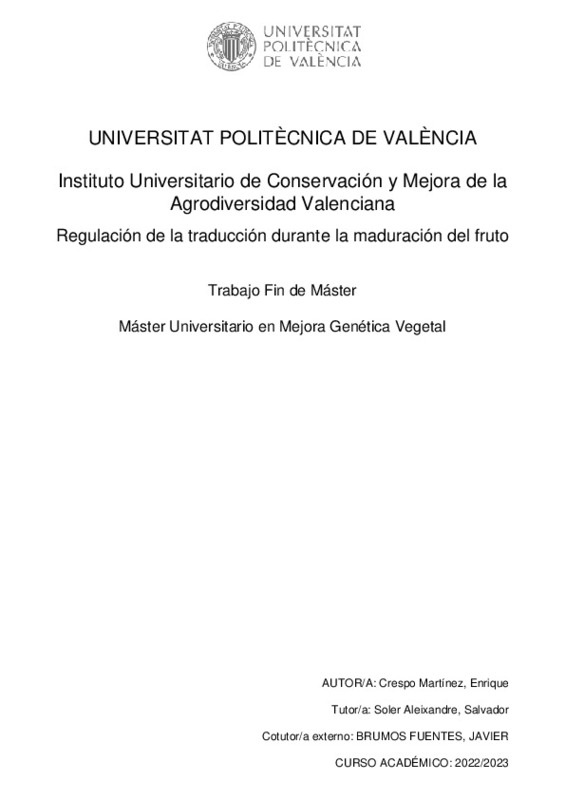|
Resumen:
|
[ES] Las plantas son capaces de adaptar sus programas internos de desarrollo de acuerdo a las señales externas que reciben del entorno. Un entorno en constante cambio, en el cual las plantas han desarrollado la habilidad ...[+]
[ES] Las plantas son capaces de adaptar sus programas internos de desarrollo de acuerdo a las señales externas que reciben del entorno. Un entorno en constante cambio, en el cual las plantas han desarrollado la habilidad de percibir e integrar toda la información del medio que las rodea. Y es evidente que, en ese proceso de integración, las hormonas vegetales juegan un papel indispensable.
El etileno es una hormona vegetal involucrada en diversos procesos de desarrollo. Es esencial en la maduración y ablandamiento de los productos vegetales y, por tanto, es uno de los principales determinantes de la calidad y vida útil de frutas y hortalizas. Una mejor comprensión de los mecanismos moleculares de cómo el etileno regula la maduración de los frutos puede tener aplicaciones directas en el sector agroalimentario.
El dogma central de la biología molecular afirma que existe una unidireccionalidad en la expresión de la información contenida en el material genético. Primero, el ADN se transcribe a ARN mensajeros, que más tarde se traducen a proteínas. El etileno producido por el fruto durante la maduración tiene un claro impacto en la regulación de la expresión génica. En las últimas décadas, hemos estudiado esta regulación principalmente a nivel transcripcional. Mientras otros niveles de regulación, como los cambios en la eficiencia de la traducción, apenas han sido explorados. En nuestro laboratorio, hemos implementado una novedosa técnica, el Ribosome footprinting que nos permite identificar ARN mensajeros regulados a nivel traduccional. Nuestros resultados sugieren que la traducción de ciertos ARN mensajeros se encuentra bajo una firme regulación durante la maduración del fruto.
En este Trabajo de Fin de Master, se estudiarán los mecanismos moleculares responsables de la regulación de la traducción durante la maduración del fruto. En primer lugar, se analizarán los ARNs regulados a nivel traduccional. En segundo lugar, se identificarán y estudiarán los elementos reguladores que confieren esta regulación de la traducción de estos particulares ARNs. Por último, los elementos más interesantes serán seleccionados y testados en planta para confirmar su función en la regulación de la traducción en respuesta a etileno.
Los resultados de este estudio nos permitirán identificar y optimizar el empleo de módulos reguladores de la traducción, los cuales son una nueva herramienta en las áreas de la biotecnología vegetal y de la biología sintética con potenciales aplicaciones a sistemas agrícolas.
[-]
[EN] Plants are capable of adapting their internal developmental programs according to the external signals they receive from the environment. In a constantly changing environment, plants have developed the ability to ...[+]
[EN] Plants are capable of adapting their internal developmental programs according to the external signals they receive from the environment. In a constantly changing environment, plants have developed the ability to perceive and integrate all the information from their surrounding environment. It is evident that plant hormones play an indispensable role in this integration process.
Ethylene is a plant hormone involved in various developmental processes. It is essential in the ripening and softening of plant products and, therefore, is one of the main determinants of the quality and shelf life of fruits and vegetables. A better understanding of the molecular mechanisms of how ethylene regulates fruit ripening can have direct applications in the agri-food sector.
The central dogma of molecular biology states that there is a unidirectionality in the expression of the information contained in the genetic material. First, DNA is transcribed into messenger RNA, which is later translated into proteins. Ethylene produced by the fruit during ripening has a clear impact on the regulation of gene expression. In recent decades, we have mainly studied this regulation at the transcriptional level, while other levels of regulation, such as changes in translation efficiency, have been barely explored. In our laboratory, we have implemented a novel technique called Ribosome Footprinting, which allows us to identify translationally regulated messenger RNAs. Our results suggest that the translation of certain messenger RNAs is tightly regulated during fruit ripening.
In this Master's Thesis, we will study the molecular mechanisms responsible for translation regulation during fruit ripening. First, we will analyze translationally regulated mRNAs. Second, we will identify and study the regulatory elements that confer this translation regulation on these specific mRNAs. Finally, the most interesting elements will be selected and tested in plants to confirm their function in translation regulation in response to ethylene.
The results of this study will allow us to identify and optimize the use of translation regulatory modules, which are a new tool in the fields of plant biotechnology and synthetic biology with potential applications in agricultural systems.
[-]
|







